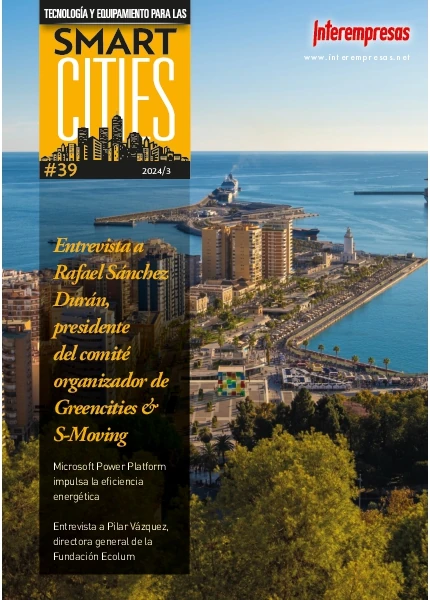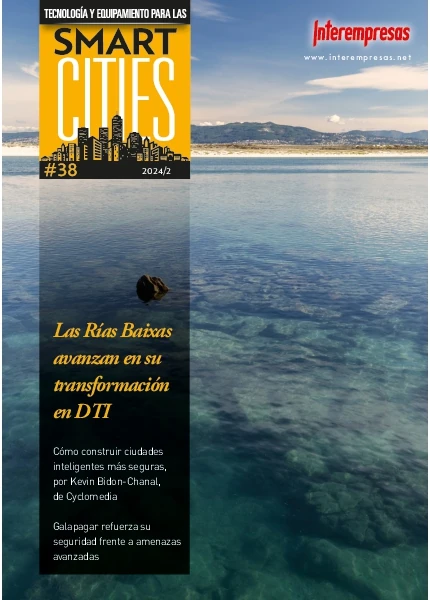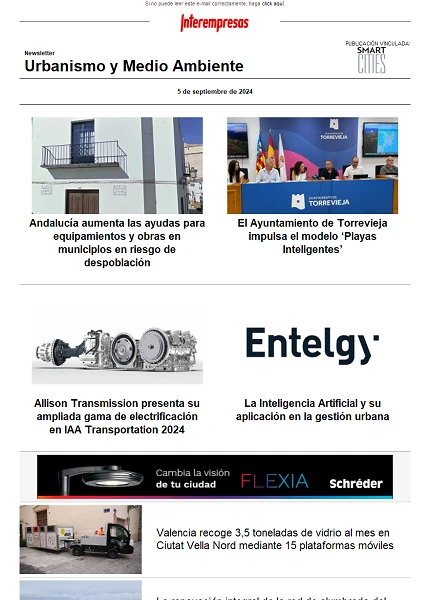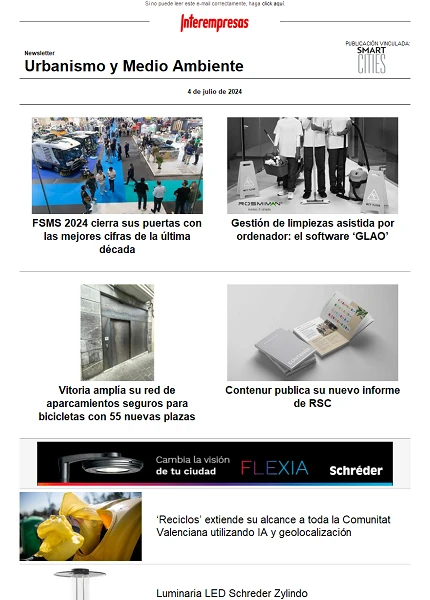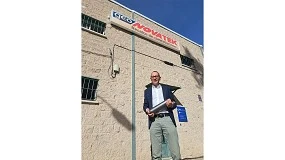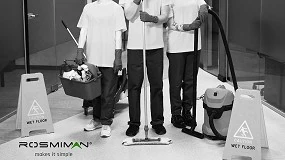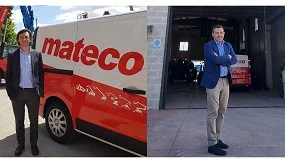“In Spain are burying fuels of better quality that those that matter from the Arab countries”
Interview to Ion Olaeta, president of the Spanish Federation of the Recovery and the Recycling (FER)
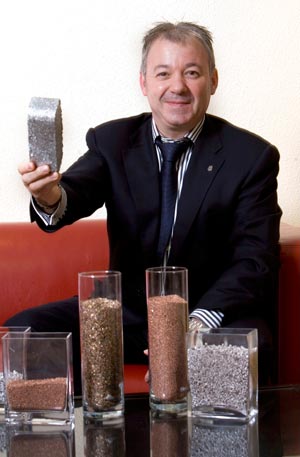
It thinks that there is a true citizen consciousness of recycling in Spain? Situate us regarding our European neighbours.
In spite of what think, the consciousness of recycling of the Spaniards is not bad. Obviously every year we go improving, but when we compare the statistics of recycling with our European neighbours see that our taxles of recycling are in the average.
And in the case of our companies?
Occurs something similar. It depends of the sector, of the region and even of the economic situation, but the true is that in the last 15 years have improved of considerable form, what has done that questions that before did only if there was a threat by part of the administration now llevar of natural form.
Which communities are more and less sensitised in this regard?
At present, the degree of environingingmental sensitivity in Spain is quite good in all the Autonomous Communities. Now well, Catalonia, Basque Country and Andalucia always stood out for being pioneering in environingingmental questions. The fact that the greater part of the environingingmental legislation emanate of the European Directives, that to his time are transpuestas through Laws and Real Decree of national field, does that there is one some convergence in these subjects.
It thinks that it is the sufficiently informed citizen in matter of recycling?
Although it has advanced , the true is that it still exists a true degree of confusion in the gestión of concrete lines of waste by part of the citizenship. Like this, almost all the world knows that when it wants to give of drop a car has to carry it to a Centre Authorised of Treatment (CAT), what before were the ancient scrapyards modernizados, between other things because of not to do it could not give of drop his car in the General Steering of Traffic. Also it goes having clear what do with the waste of containers, paper, cardboard and glass although they still remain some doubts. The problem is used to to arise when the citizen confronts to waste more complex or dangerous like oils, batteries or electronic waste. In these cases the degree of desconocimiento or the effort that supposes to carry the waste to a clean point do that they comment a lot of more errors and manage wrongly.
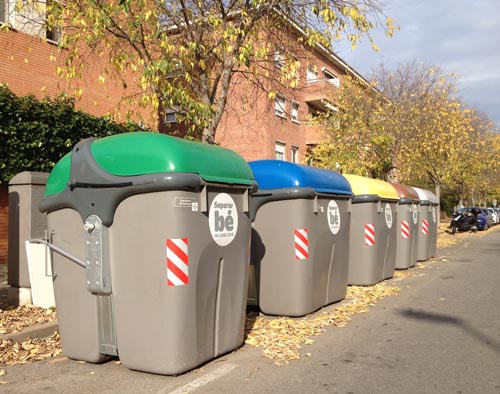
And these errors bring achieve economic and environingingmental consequences, no?
Unfortunately, yes. For putting him an example, when somebody deposits a residue in the container of containers without having extracted the organic product that contained goes to hamper a lot the correct reciclabilidad of said residue. Something seemed raisin when they abandon in the street waste like the electronic and are ‘canibalizados' by informal operators.
What would stand out of the evolution of the sector in the last years?
Definitely, the bet by the continuous progress and the investigation. It remains widely showed by the improvement in the percentages of recycling and valorisation of the waste that from the sector manage.
Attain to fulfil with the aim of 85% of valorisation of the Vehicles Out of use in 2006 and now are working duramente stops attains to elevate this percentage to 95% for the 2015.
Of all the waste that recycle , which present greater difficulty? Why?
The complexity in the reciclabilidad of a residue comes given by three factors: the residual value of the materials obtained, the mix of different components and materials in an alone object and the heterogeneity in the types of waste. Therefore, the waste that present greater difficulty are those that having little value, are composed of a big mix of distinct materials and, besides, find mixed with another waste.
For example?
The containers. Imagine the difficult that can result recycle a tetrabrick if we have to separate it of the other waste of containers and afterwards, besides, owe to treat to separate the different layers of plastic, cardboard and aluminium that compose it. And all this to obtain material of little economic value since of the only with a high theoretical value, the aluminium, the quantity that obtains is very small.
I understand. It can recycle all what arrives to our containers?
Technically everything is recyclable. Another thing is that it was it economically. With this want to say that if we devote infinite quantities of money all is recyclable but, obviously, and more in the current situation, this is not possible and therefore we have to treat to facilitate the reciclabilidad of all the possible forms. One of the problems with which find us is that a big part of the waste that generate do not go (neither have to go) to the rubbish containers of the street. As it commented these only serve for a part of the domestic waste.
On the other hand, find us also with the problem that so that something recycle of optimum way is important that when this product conceived and manufactured had taken into account this to the hour of his design. What find us in the reality is that any product has different materials and components mixed and, besides, his desmontaje is very complex. Thus, the reduction to fractions of material homogéneo, something essential to the hour to recycle, complex return and sometimes work almost impossible.
The recycling to the environingingment
Live in a finite planet and therefore the resources with which explain are limited. If every time that we want to manufacture something go to the nature and take it will finish for exhausting the natural resources. Besides, it explains Olaeta, to this have to join that the human being uses so many renewable resources as no renewable. In the first case, if our demand of resources is greater that the capacity of the nature to generate it find us with the first limit (example: the wood to do paper). On the other hand, if the resource that want to use is no renewable (metal or plastics) then once that we have extracted it of the nature this will not go back to generate .
“The only form therefore to treat to ensure a procurement of raw materials to our productive system without exhausting the resources of our surroundings is maximizar ours capacity and quality to recycle”, sustains the president of the Spanish Federation of the Recovery and the Recycling. A metal, if it selects properly and of way homogénea, can recycle of infinite form, and remains showed with the fact that, for example in Spain, 85% of the steel that produce comes of the recycling of scrap. Likewise, it continues Olaeta, recycles 40% of the aluminium or 50% of the copper. In the case of the lead, the capacity of the recycling is even greater, as it does already 20 years that closed the last mine of lead. 100% of this metal recycles one and again. Some plastics also can recycle whenever they classify well, from here the importance that the manufacturers treat to homogenise the plastics to the hour to manufacture his products. Finally, the recycling of materials like the paper, that can arrive to recycle until 7 times, allows that the cycle of regeneration of the nature do his part.
“The recycling is essential for the environingingment. The nature, in fact “recycles” all when it produces. We will be so much more adapted to the sustainability of our planet in the measure in that we are able also to recycle what generate”, sentence Olaeta.
Which opinion deserve him the laws that regulate the gestión of waste in our country? What would add, would modify or would suppresses? It exists some empty legal?
As it commented before, in the last 15 years the sector of the recycling in Spain has advanced of surprising way and part of this advance has been due to the arrival and transposition of environingingmental legislation that has forced to do the things of another form.
Does hardly a year has approved a new Basic Law of Waste and Floors Contaminated (22/2011) that has come to substitute to the previous of the 1998 (10/98). Without being perfect this new Law if it has stepped forward in the recognition of the work of the recicladores opening the door to that the already processed waste and smart for his utilisation in new productive processes can be left to consider like waste to be considered products. Also it has advanced in the administrative simplification in the gestión of waste, although even it remains a lot that walk in this sense.
The fact that each community have his competition and authority in matter of environingingment neither helps, truth?
No, that is one of the problems that have in our country. It is fundamental that llevar a coordination and homogenisation of the requirements that demand to avoid the creation of artificial barriers to the movement of recyclable materials. Nowadays, carry a truck with recyclable waste, from Huelva to Barcelona will require of different documentation in function that it go by the interior or by the coast like consequence that they cross different autonomous communities. This does not have felt.
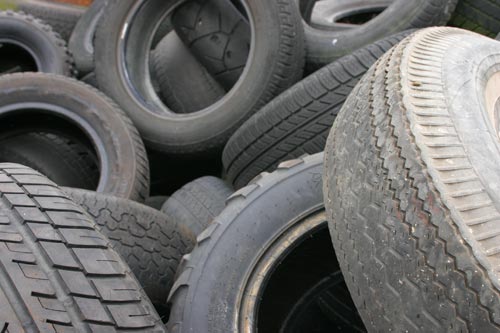
To what other challenges confronts the sector in our country?
At present confront us, as all the Spaniards, to the problem that supposes the economic crisis that are crossing. Our sector is a faithful reflection of the state of the society: if the society buys trucks, we recycle the trucks out of use that they withdraw . If the society changes the appliances by other new more efficient, we recycle the old. If to the society buys any product, we recycle the rests and waste of the production of the same managing them directly from the factories.
And when the economy does not work…
As we are the first in feeling it in shape of merma of the material that arrives to our plants. To this challenge joins another consistent in the denostada fight of our sector against the illegal operators that without licence some neither fulfillment of environingingmental norms trafican with valuable recyclable materials, arriving even to the theft of said material so much in plants of recycling as in the public road. The police does his work and is used to to detain to these subjects. We carry years working so much in the national field like international against this problematic and trust that, little by little and between all, can go putting him coto.
The past month of October, the federation fulfilled his 30 anniversary. They have complicated with the expectations?
As it can imagine in three decades has occurred almost of everything. In reality, we do not have at all that see with what were 30 years ago and, on the other hand, keep on being the same. The aim that pursued the founders of FER in the year 1982 was the one to create an organisation that, with national character, could represent to the industry of the recycled and defended his interests. Definitely, this aim has fulfilled . Nowadays our sector gives work of direct form to more than 30.000 people. In FER integrates more than 90% of the gestión of vehicles out of use, waste of electrical and electronic devices, demoliciones, tyres and a long list of recyclable waste.
Although in 1982 did not represent more than to some tens of companies, nowadays, with almost 300 associated of direct form and more than 500 of indirect form through the regional associations are the Association that represents the interests of a sector that, as ours, is key for the economic development of our country.
In this sense, think that the conclusion is clear: yes they have reached the aims posed does now 30 years.
On the Agreement Mark for the Energetic Valorisation of Waste
Speak us of the energetic valorisation in our country. Which is the situation?
Our country at present finds in a process of continuous improvement regarding the aprovechamiento of the energetic potential of the waste. Although other countries like Holland or Germany, in which the social perception of this industrial activity is better perceived, go in command, Spain has known to put the batteries in the last years. The citizens little by little go comprising that, for example, use an old tyre triturado like fuel in replacement of the same quantity of coal mattered —with the advantage that besides the tyre issues 30% less than CO2 fossil and a fourth part less than sulphur— is something positive. During years, nevertheless have been depositing in material dump with a big energetic potential especially because of the social barriers and the legal barriers derived these last of said social barriers.
And which opinion thinks that has the citizen of the energetic valorisation?
As it commented, when to the citizen speaks him of valorizar energetically any residue imagines or a dump burning or a demonstration of agriculturalists cutting a road with a mountain of tyres burning. The image of this process, that in Europe is totally normalised, is bad, more by desconocimiento that because the activity in himself was criticable.
Besides, has confused a lot to the citizens mixing the incineration with the energetic valorisation.
Explain us the difference.
The first has like aim the elimination of waste, whereas the second only uses waste whose energetic potential can substitute to a traditional fuel in a productive process. To this confusion, many times without pretending it, have contributed the groups environingingmentalists that have done that they send to dump waste that could have valorizado energetically by a question of technological prejudice to this activity. As it said somebody does time, in Spain are burying fuels of better quality that those that matter from the Arab countries.
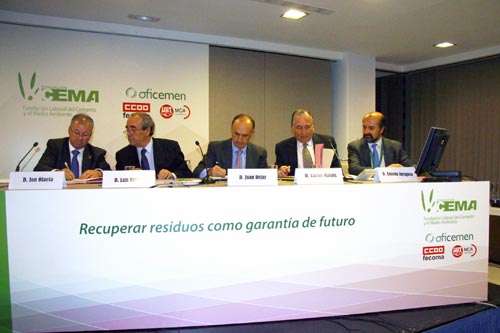
The aim that marks with this agreement, renewed recently by FER, Oficemen and Sigrauto, is to reach that valoricen energetically 50.000 annual tonnes of fractions from the fragmentation of the vehicles in 2015. As they aim the organisation, The energetic valorisation favours the fulfillment of the environingingmental obligations contracted in Kyoto as well as the fulfillment of the aims of recovery of the vehicles at the end of his useful life. In Spain give of drop some 700.000 tourisms to the year of whose total weight the legislation allows at present allocate until 15% to conventional dumps, being this the worst environingingmental solution. This figure will have to reduce to only 5% for the year 2015.
And with that arguments can convince to his detractores of the profits of the energetic valorisation of the waste?
Think that is simple. Spain is a country in which the energetic resources are scarce and, therefore, have to take advantage of to the maximum those that have. The goods that, once covered his cycle of life become in waste and are not recyclable, can have a last use in shape of power. Of not being like this his destination will not be another that the dump. Besides it is important that the public know that to use waste like alternative fuels subjects to the companies to strict controls of monitoring in continuous to ensure that his broadcasts are totally controlled, until the point that this does that those companies that valorizan waste, when improving his systems of process, have fewer broadcasts that those that burn traditional fuels like the coal, the gas or the oil.
Going back to the Agreement Mark for the Energetic Valorisation of Waste, in what consists?
In this agreement, that has renewed between Sigrauto (the association that integrates to manufacturers, desguazadores and recicladores of trucks), Oficemen (the association that represents to the industry cementera Spanish) and the own FER, what seat are the bases to follow advancing in the extension of the utilisation of the no recyclable waste that come from of the treatment of the vehicles at the end of his useful life (rubbers, rubbers, rubber-foam, wood, cloths and some plastics) like fuels in the process of manufacture of Clinker (basic prime matter of the cement).
This waste by his heterogeneity and his presentation in the process of recycled and treatment of the vehicles are not at present recyclable and have to go to dump. Even so, nowadays and as it commented previously it attains recycle more than 80% of the vehicle. The industry of the recycling is engaged in following advancing and therefore it is fundamental that attain to take advantage of any resquicio of improvement.
Have analysed the composition of the vehicles and the one of the waste that at present go to dump and have discovered that said waste are not dangerous and besides have a power calorífico important what would allow, to follow advancing, that went used in replacement of the coal of import in the ovens of cement.
What will contribute the adoption of the agreement?
Thanks to this agreement of collaboration go to put in common experiences that already have initiated and go to exchange the best practical known with the aim to advance in the percentages of valorisation (valorisation = recycling + energetic valorisation) of the vehicles out of use (VFU).
Already there is several fragmentadoras of VFU in Spain that are working with cementeras but want to that said practices go extending. And we are fully convinced that the result of this conjoint effort will achieve to reach the aims posed.

